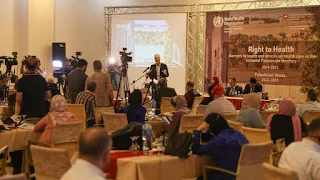On Tuesday, the World Health Organization called on Israel to facilitate the movement of Palestinian patients to receive treatment, asking it to bring medicines and medical equipment to the occupied territories, especially the Gaza Strip.
This came in a report entitled "The Right to Health 2019-2021", which the organization reviewed during a press conference in Gaza, along with another report called "Palestinian Voices 2022-2023", to highlight the obstacles to accessing health care in the Palestinian territories.
The report stated that the organization recommends that Israel "end the arbitrary delay or refusal to grant permits to patients and facilitate their access with their companions to all Palestinian areas, as well as issuing longer permits for patients suffering from chronic diseases."
It also called on Israel to "facilitate the entry of medicines and medical equipment into the Palestinian territories, especially Gaza, and provide health services independently for Palestinian prisoners (prisoners)."
The organization urged the Palestinian National Authority to "give priority to health care expenditures," recommending the international community to "develop the Palestinian health sector."
In its report "The Right to Health", the organization documented "about 563 attacks against health care in the occupied territories, including East Jerusalem, between 2019 and 2021."
She explained that "288 of the total attacks against health care were in the West Bank, including 93 attacks in East Jerusalem, and 275 attacks in Gaza."
The organization did not mention the source of these attacks, but previous Palestinian human rights reports said on more than one occasion that "Israel is committing hundreds of violations against health facilities and personnel in the West Bank, Jerusalem and Gaza."
The report indicated that the total number of health care worker injuries reached "166 workers in the West Bank and 297 in Gaza."
The report documented the damage of "373 ambulances as a result of attacks, including 162 cars in the West Bank and 45 vehicles in Gaza," in addition to recording damage to "151 health facilities, 24 in the West Bank and 127 in Gaza."
The report monitored "the arrest or detention of about 27 health care workers in the West Bank, and the arrest and detention of 8 patients or their companions from Gaza."
During the conference, the representative of the organization in the occupied Palestinian territories, Richard Peppercorn, said, "The findings of this report support the collective advocacy of the Palestinians' right to health."
He added: "The organization remains committed to documenting and monitoring the obstacles that prevent the realization of the right to health, and is also committed to its efforts to address the structural and root causes of these obstacles, as well as to promote respect and protection for the realization of this right."
He pointed out that there are obstacles in the entry of medicines and medical equipment into Gaza, pointing out that his organization will be on its agenda - upon his return to East Jerusalem - to study ways to assist the sector in this regard.
For his part, Thomas Jenach, Deputy Director of the Swiss Agency for Development, said during the conference that "the Palestinian territories suffer from occupation, lack of resources, the health care system, the dismemberment of areas, and the limitation of access to receive this care," expressing his concern about "these obstacles."
The health sector in Palestine is witnessing a noticeable decline and a shortage of medical supplies, in addition to the difficulty in the movement of patients in the Palestinian areas to receive treatment due to the Israeli measures, in addition to the tightening of the Israeli blockade on the Gaza Strip for about 16 years.
Tags:
health

